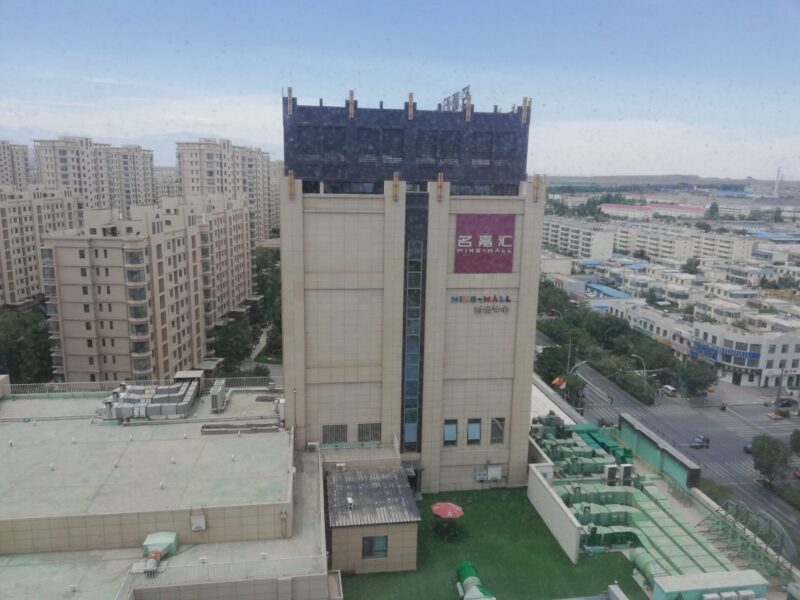The train arrived precisely on time at 21.12 and, having come from Urumqi, was already full. It was the “fast train” which took 9 hours to get to Jiayuquan as opposed to 3 on the bullet train. A further 10,000 people piled on and we found ourselves stuck in a very narrow corridor with endless queues of people trying to get past in both direction with enormous great suitcases. We were lucky not to get broken legs or crushed feet. A man gave Jennifer his little collapsible seat, which many passengers were carrying, and a lady with two small children who Jennifer started talking to on the platform squeezed the kids up and ger her their seat. Eventually a young girl whose job it was to arrange all the suitcases in the luggage racks to cram even more luggage in demanded to see our tickets and, before long, the carriage supervisor turned up who looked at our tickets and motioned us to struggle our way past people and suitcases into another carriage where he turfed two people out of their seats. I felt highly embarrassed but the young girl whose seat I was given smiled so sweetly and waved me into the seat, so how could I refuse? I wonder if the grumpy ticket-seller at Turfan had taken pity on us and sold us tickets for seats.
It was getting dark but I could see that the train was passing through the Black Gobi, which consists of black pebbles with the occasional patch of yellow sand. Mildred Cable called it a “howling wilderness” and, while it wasn’t howling, it was certainly a wilderness. There was a range of low mountains to the north, an extension of Flame Mountain, and a range of much higher snow-covered mountains to the south.
The following 9 hours were a misery, tempered only by the fact that hundreds of other passengers were still standing so things could have been a lot worse. On my side of the carriage, I was sitting opposite a lady smothered in make-up and wearing the must ridiculous shoes with 6-inch heels. On Jennifer’s side, she was sitting opposite the woman’s husband who couldn’t keep still for a minute and eventually lay down in the corridor and tried to sleep. The train stopped at Hami, which was a village in Mildred Cable’s time but is now a mega-city glowing with neon light. I noticed that the lamp standards have models of melons on them (Hami is famous in China for its honeydew melons) which Turpan lamps had models of vine leaves with bunches of grapes.
When we finally got to Jiayuquan, numerous officials bellowed “Jiayuquan” in our ears in case we didn’t hear it the first time, and we were grateful on coming out of the station to see an IBIS hotel. The receptionist examined our passports, asked how many nights, smoking or non-smoking, standard room or queen room, and after 40 minutes (because she kept stopping to deal with other people) told us all the rooms were taken. What an idiot. An unsympathetic receptionist at an OYO hotel across the road told us she couldn’t take foreigners so we got a taxi and the driver took us to the opulent (and very expensive by Chinese standards) Ming Nuojin International Hotel where we got a 12th-floor room. A receptionist called Grace could speak some English, and she very kindly took me to a nearby pharmacist where I could buy the Chinese equivalent of Metformin.

View from the hotel in Jiayuquan